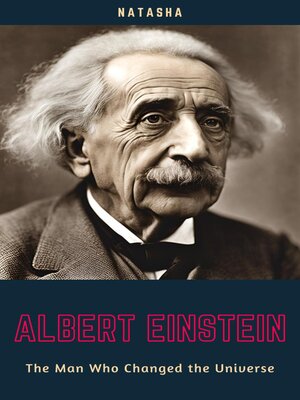
Sign up to save your library
With an OverDrive account, you can save your favorite libraries for at-a-glance information about availability. Find out more about OverDrive accounts.
Find this title in Libby, the library reading app by OverDrive.



Search for a digital library with this title
Title found at these libraries:
| Library Name | Distance |
|---|---|
| Loading... |
Albert Einstein's life and work are a testament to intellectual curiosity, resilience, and profound societal impact. Born in 1879 in Ulm, Germany, Einstein's early interest in mathematics and physics was evident, though his independent thinking often clashed with traditional education. After initial setbacks, he excelled at the Swiss Federal Institute of Technology (ETH Zurich), where he studied under influential professors and graduated with a diploma in mathematics and physics.
In 1902, Einstein began working at the Swiss Patent Office in Bern, a job that provided financial stability and intellectual stimulation. During his time there, he engaged in theoretical reflections and discussions with the Olympia Academy, a group he formed with friends to explore science and philosophy. This period culminated in his annus mirabilis of 1905, when he published groundbreaking papers on the photoelectric effect, Brownian motion, special relativity, and the equivalence of mass and energy.
Einstein's academic career advanced rapidly, leading to positions at the University of Zurich, the German Charles-Ferdinand University in Prague, and ultimately the Prussian Academy of Sciences and Humboldt University of Berlin. His directorship of the Kaiser Wilhelm Institute for Physics further solidified his status as a leading figure in the scientific community.
World War I marked a period of ethical reflection for Einstein, who opposed Germany's militarism and advocated for peace. His work on general relativity, published in 1915, revolutionized physics and earned him global acclaim. In 1921, he was awarded the Nobel Prize in Physics for his explanation of the photoelectric effect.
Einstein's later years were marked by international advocacy and intellectual engagement. He traveled extensively, promoting scientific cooperation and cultural exchange. His principled opposition to Nazism led to his emigration to the United States in 1933, where he continued his research and advocacy for human rights.
Einstein's legacy extends beyond his scientific achievements, encompassing his role as a champion of peace and social justice. His theories of relativity and contributions to quantum mechanics reshaped our understanding of the universe, while his moral clarity and commitment to global cooperation continue to inspire future generations.







